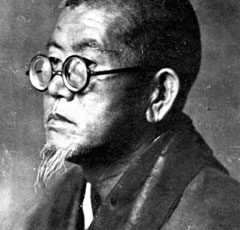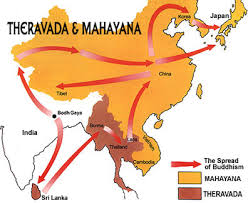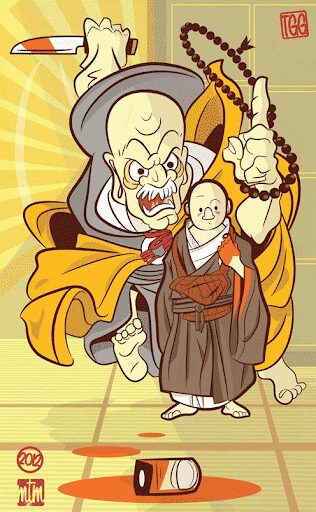Cakkavattisihanāda Sutta is also known as The Discourse on the Lion-roar of the Wheel-turner. This Sutra is an important early discourse (number 26 in the Dīgha Nikāya) and it deals with the notion of the cakravartin or Buddhist universal ruler. The discourse narrates a story showing how a society’s prosperity or decline depends in large part on the policies adopted by the ruler. It is said that at the end of this discourse, twenty thousand monks became arahants and eighty-four thousand others realized the Truth.
The term cakkavatti (Skt cakravarti ) is translated as “wheel-turner”, but it is sometimes more freely rendered as “universal monarch,” or even ”world emperor.” Lion’s roars are “utterances which the speaker is willing to defend in public”, in line with “the Vedic tradition of challenges in debate”.
The discourse was given by Buddha during the time he was staying among the Magadhans at Matula. It was meant to be a sermon on the necessity of living in accordance with the Dhamma, with the Dhamma as one’s refuge. In this Sutra, the Buddha also teaches about the true meaning of long life, beauty, happiness, wealth, and strength.
“For, having turned the wheel that has arisen, he is a wheel-turner, a cakkavatti, because he wields the wheel jewel or, because he has the wheel jewel turned. He turns with the wheel endowed with four characteristics (that is, the conditions for conciliation, generosity, pleasant, convincing speech, beneficial conduct and impartiality) for the benefit of others; and there is the turning of the wheels of posture (standing, walking, sitting, reclining) in this.”
In the Sutta, Buddha is teaching the monks to “dwell with yourself as an island” that is, to practice the four focusses of mindfulness, the result of which is the purifying of the mind. The meditation practice is said to bring about “the monk’s five blessings” of long life, beauty, happiness, wealth and power. The Buddha explains their meanings in detail, declaring that true monastic power is that of the spiritual awakening. The body of this Sutra consists of a narrative illustrating the power of skillful action.
The Sutra is a discourse composed probably during Asoka’s time, and its purpose is not so much the legitimization of the Buddha as a universal teacher, but as a memento to the emperor – the “world monarch” – to practice good governance. This is the only place in the Pali Canon where the future Buddha, Metteyya (Maitreya), is mentioned. While the Mahayana trend was to deify the Buddha, the more conservative Hinayana monastics worked on the Buddha-lineage, extending it into the near future (in cosmic time).
The Sutta contains the story of the Cakkavatti Dalhanemi and his eldest son and the manner in which a Cakkavatti administers the law – ruling by righteousness, over a people – made virtuous by his instruction. But, later, it shows a gradual corruption of morals, followed by the decay and destruction of human life with all its attendant comforts. The end of the Sutra brings a gradual restoration of virtuousness, accompanied by the return of prosperity and longevity.
Some forms of Buddhism hold a belief in cycles in which the life span of human beings changes according to human nature. In the Cakkavati Sutra, the Buddha explains the relationship between life span of human beings and their behaviour. According to this Sutra, unwise behavior was unknown among the human race in the past. As a result, people lived for an immensely long time, endowed with great beauty, wealth, pleasure, and strength. Over the course of time, though, they began behaving in various unwise ways. This caused the human life span gradually get shorter.
The Sutra states that poverty is the cause of immorality and crimes such as theft, falsehood, violence, hatred, cruelty, etc. Because in the past the kings have tried to suppress crime through punishment, Buddha suggests that, in order to eradicate it, the economic condition of the people should be improved. When people are provided with opportunities for earning a sufficient income, they will be contented; will have no fear or anxiety, and consequently the country will be peaceful and free from crime. In this Sutra, the Buddha declares that the ideal ruler (cakkavatti) should rule in accordance with the universal moral law (Dhamma).
“Monks, live with yourself as your island, yourself as your refuge, with nothing else as your refuge. Live with the Dhamma as your island, the Dhamma as your refuge, with nothing else as your refuge. [1] And how does a monk live with himself as his island, himself as his refuge, with nothing else as his refuge; with the Dhamma as his island, the Dhamma as his refuge, with nothing else as his refuge? There is the case where a monk remains focused on the body in and of itself — ardent, alert, and mindful — putting aside greed and distress with reference to the world. He remains focused on feelings in and of themselves… mind in and of itself… mental qualities in and of themselves — ardent, alert, and mindful — putting aside greed and distress with reference to the world. This is how a monk lives with himself as his island, himself as his refuge, with nothing else as his refuge; with the Dhamma as his island, the Dhamma as his refuge, with nothing else as his refuge.”
photo credit: yimg




